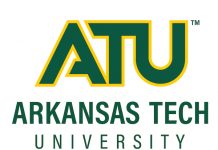An otherwise non-descript spiral notebook sits on Dr. Alaric Williams’ desk in Crabaugh Hall at Arkansas Tech University.
Inside that notebook is the knowledge he gained from pursuing professional development at the American Association of Blacks in Higher Education (AABHE) Leadership and Mentoring Institute July 8-15 at Texas Southern University in Houston.
“This thing is full of notes that I have been referring to in the two weeks that I have been back,” said Williams, interim head of the ATU Department of College Personnel and associate professor of college student personnel. “How should I handle this situation? What would someone in a leadership role do about this? It’s my how-to notebook from an amazing experience.”
Williams was among 19 individuals from around the United States selected to participate in the 2018 AABHE Leadership and Mentoring Institute. He applied for and was the recipient of a scholarship to attend.
According to the AABHE, the institute is designed to “support African-Americans who want to acquire information and skills to prepare them for senior administrative and faculty ranks.”
Williams has worked in higher education since 2002, first as a staff member and for the past decade as a faculty member.
He is a three-time graduate of Texas A&M University-Commerce with a bachelor’s degree in kinesiology, a master’s degree in counseling and student affairs and a doctorate in higher education supervision, curriculum and instruction.
Williams joined the ATU faculty in 2015 and was a member of the inaugural Leadership Tech cohort.
He learned about the AABHE Leadership and Mentoring Institute through Dr. Keegan Nichols, vice president for student affairs at ATU, and Dr. Barbara J. Johnson, vice president for accreditation relations at The Higher Learning Commission.
Williams also credited Dr. Mary B. Gunter, chief of staff in the ATU Office of the President, along with Dr. Linda Bean, dean of the ATU College of Education, for supporting his attendance at the AABHE institute.
“Dr. Bean said I was glowing when I got back,” said Williams. “We had individuals from all over the nation come in and do sessions with us on topics such as strategic planning, administration and leadership, personality conflicts…basically how to lead and manage people. The session on financial management, strategic budgeting and resource alignment was one of my favorites.
“Probably the most eye-opening session was hearing the unfiltered experiences from individuals who have been in higher education for 30 or more years,” continued Williams. “These were former presidents, former vice presidents and former chief financial officers who told us how they went from being faculty or staff to taking on leadership positions. It was beneficial to hear the real side of their experiences.”
Williams said he is interested in giving back to the institute by returning as an alumni participant and speaker in future years. One early outcome of his attendance in 2018 is the beginning of preliminary research with colleagues from Texas Southern University and New Mexico State University that he met in Houston.
“By the second day, we gelled as one big group,” said Williams. “We’re still communicating with each other to see how everyone is doing, and some of us have begun conducting research together. Not only were we learning how to improve to become better leaders and managers…it was a way to network.”





